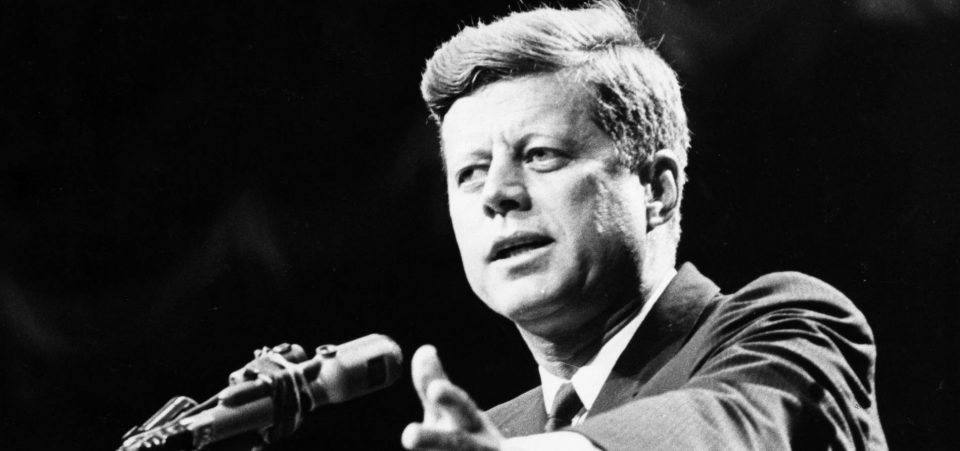The Democratic Party Must Revisit John F. Kennedy Social Liberalism to Win Again; Can It?
Far from Russian “meddling” in the 2016 U.S. presidential elections, the real cause of Hillary Clinton’s loss to now President Donald Trump is a lack of identity.
The Democratic party itself has lost its compass. It has no idea whether to be progressive in the Roosevelt “New Deal” sense of the term or whether it should sink deeper into the quagmire of identity politics. Moreover, in going after the unspecified “center,” it has also adopted much of the language and ideas of capitalism, albeit of the Silicon Valley variety. Meanwhile, the U.S. government’s release of the John F. Kennedy files may prompt aspiring leaders of the Democratic Party to draw inspiration from this iconic president.
Rather than join the choirs singing from the songbook of Cold War gospel, the Democrats must think ahead. If they don’t get past Clinton, she will reappear and run again. Even those who were sensible enough to blame Clinton herself for the defeat remain baffled about what the Democrats must do to win again. Yet, the 2016 Democratic Party campaign sent more than a few rather strong signals.
Hillary Clinton Failed to Deliver What Traditional Democratic Voters Wanted
The problem is that Clinton and her camp totally tuned the voters out—deliberately, it seems.
Simply put, Bernie Sanders, had he been given an equal chance, would have scored a decisive win in the Primaries over his more ambitious rival, the very personification of the character Tracy Flick from “Election”—a prescient film that all American voters should watch. Sanders spoke like few recent Democrats have in a long time.

Credits: Jamie McCarthy/Staff/Getty Images
He returned to the basics that drew so many to the Party in the 1960s and 70s, and in the 30s and 40s before that. Sanders echoed the likes of Gary Hart, Ray McGovern, Franklin Delano Roosevelt, and even Henry Wallace. He also echoed John F. Kennedy.
It worked. Sanders’ rise in the Democratic primaries was as surprising as it was significant. Alone, he managed to inspire crowds, young and old, who would have come out in droves to vote for him. His campaign harkened back to themes of social democracy, or what many would call John F. Kennedy social liberalism.
Suggesting that the Democrats should pick up where JFK social liberalism left off is hardly trail-blazing stuff. What might be radical, however, is getting the Democrats to understand that they need to adopt it to win again.
The Democrats picked up considerable heavy baggage over the Barack Obama years. Other than the diluted effort to make it more affordable for Americans to afford healthcare, there was little that was socially democratic about Obama’s presidency.
The wealth gap between the richest and poorest Americans widened from 2009 to 2016. The stock market has hooked millions of investors, thanks to quantitative easing (i.e. super-low interest rates). But stagnant growth, by American standards, means that the real economy has been suffering.
In foreign policy, far from pulling the United States from Middle Eastern wars, Obama got Washington even more involved in the region than any of his voters could have imagined in their wildest nightmares.
Obama’s Legacy Won’t Help the Democrats Win
The legacy of Obama’s less than liberal foreign policy will be felt in the region and neighboring countries for decades to come.
As Secretary of State, Hillary Clinton had a big hand in much of this. Failing to understand the intricacies of Libyan society, she triumphantly declared “We came, we saw, he died” when the Libyan dictator Muammar al-Qaddafi died. (Source: YouTube.) Not that Americans—or Democrats specifically, for that matter—were especially enamored with the Libyan dictator.
But, Clinton and Obama failed to understand how important Qaddafi was in maintaining stability in the entire Middle East and North Africa. ISIS emerged from a number of factors, but Qaddafi’s demise allowed Libya to serve as a major terrorism recruitment base, fueling the migrant and refugee from North Africa phenomenon and the war in Syria. The war parties in Congress and the military hardware makers were none too displeased.
Where the Obama and Clinton Democrats went heavy was identity politics. In the face of new wars abroad and ever rising gaps between the richest and the poorest Americans, the Democrats insisted on a strategy of protecting and mobilizing voters on the basis of identities (race, gender or sex). To some extent, there is a case to be made for fairness and personal freedom, but the liberal “identity” message has become too mixed up in the deconstructionist, post-Marxist discourse of the likes of French philosopher Jacques Derrida.
The Perils of Political Correctness
It has lost all pretense of sense. From promoting fairness, identity politics have collapsed into arrogant thought control and illogical demands. Many university campuses have become the battlegrounds of the new extreme sport of identity politics. No longer hallowed ground for the exchange of ideas and free speech, in the Obama years, academic institutions have come closer to reflecting the world of George Orwell’s “1984” than ever. Perhaps, episodes such as those at Evergreen State College involving students violently challenging the academic curriculum instead of debating it scientifically have scared many once dyed-in-the wool Democrats to steer clear of the “liberals.”
Indeed, Trump winning may have had much less to do with unemployed Americans worried by the perils of globalization economic policies and immigrants taking over their jobs. It wasn’t Russian meddling either that promoted Trump. Instead, Trump’s direct approach, his willingness to speak candidly—to an excess—sent Americans the message that he would make being politically incorrect cool again. Secretly, perhaps, under the privacy of the voting booth, many Americans, Democrats and Republicans, fed up with political correctness put the “X” over Trump’s name on the ballot.
Similarly, the centrist approach has not worked out well for the Democrats. The old adage that you can please some of the people some of the time but not all of the people all the time might come in handy for future Dems.
In June’s special congressional election, in Georgia, Democratic candidate Jon Osoff repeated all of the Democrats’ mistakes. Osoff went too right to appeal to traditional Democrats and he lost to the real deal. Why should Republicans vote for a Democrat when they can go for the real thing?
Osoff’s race in Georgia is the prototype for why the Democrats aren’t winning. They have no real ideas and have gone off the traditional social democratic message of the big names in the Democratic Party. Bernie Sanders has been the most successful Democrat of the past few years. He has generated an entire movement around him and there’s arguably no politician more popular than him in all the land.
Sanders campaigned on the economic difficulties of the middle class and pulling back from war and militarism. He harkened back, ever so slightly, to one of the most eloquent and beautiful speeches that John F. Kennedy ever delivered, at American University on June 10, 1963. (Source: YouTube). Hillary Clinton would have won a landslide with even a fraction of the sentiment in that speech alone.
Barely 10 days after the 2016 presidential election. Liberal philosophy professor and writer Mark Lilla addressed the reasons for Clinton’s defeat early on. Before Russiagate became fashionable, Lilla had blamed an excess of “identity politics” for Clinton’s loss in an article that couldn’t have been clearer in its message. (Source: The End of Identity Liberalism, The New York Times, Nov. 18, 2016.)
The Democrats must overcome “identity liberalism” and reach for a more JFK approach. Sanders, who campaigned, focusing on the economic difficulties of the middle class, has already shown that this is the path that could lead to victory.
By failing to address the liberal drift from arguments based on promoting economic equality and fairness to dogmatic positions on too many subjects, the Democratic Party leaders have abandoned their base. They have chosen to rely on the so-called “Social Justice Warriors.”
Far from blaming Russia, Hillary Clinton should be wondering why none of her “advisors” advised her to think more Kennedy and less Madonna at the post-Trump inauguration Washington anti-Trump rally.






